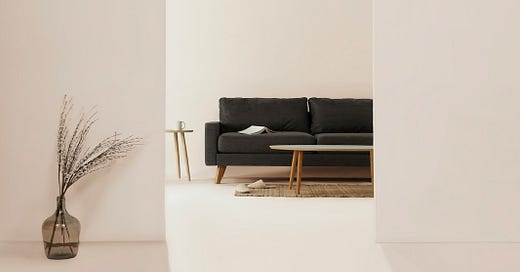I don’t like excess stuff or clutter. I’d be content in a small, simple, thoughtfully designed home. Marie Kondo-ing my space brought me genuine joy. I prefer having fewer things, but I value quality.
At one point, I pared my wardrobe down to about 50 items, and it was life-changing. It gave me the freedom to wear only the things I truly loved. I learned that most of my clothes are solid colours - white, navy, or dusty pink. I like recipes that are simple but taste great—not overly complicated ones. I eat the same breakfast nearly every day. In school, I was marked down for answers being too succinct.
As a chiropractor, I’ve taken a minimalist approach to my practice too. Many of my colleagues use a wide variety of techniques and tools, but I’ve chosen to focus on just 1-2 techniques and master them. Quality over quantity.
I apply the same principle to parenting. What did tribal cultures do? They didn’t have the gadgets and shortcuts we have today to "make parenting easier." But does all that stuff really make it easier? I’m not convinced - I don’t know many parents finding it easy. It isn’t quick fixes we need for parenting - it’s support and simplicity. For me, it’s about coming back to the values I hold as a parent and cutting out what we don’t need.
This minimalist mindset has also shaped my approach to health. Health has become such a big business, and there’s always a new trend or fad to follow. It fascinates me how much we spend on healthcare, and yet, in general, we’re less healthy than ever.
I wonder: what did the generations before us do that we don’t? I’m not talking about our parents—who had microwave dinners, low-fat everything, and non-stick pans. I’m talking about much earlier generations, the ones who lived close to the earth, ate simple whole foods, and knew where their food came from. It was definitely simpler times.
I don’t believe that we always need more information and more tests, or to find smaller particles that are causing your problems. I prefer the broader approach of what needs to be changed in my life to make this better, and learning to trust my own instincts and intuition.
Becoming a "Health Minimalist" means I focus on what truly matters for my health. I don’t want to waste time chasing every new health trend. When I slow down and focus on the basics, the answers usually become clear. It’s the distractions and endless options that keep us searching for answers.
This also doesn’t mean I do it all on my own. I see practitioners who support the work I’m already doing internally. I don’t rely on them to fix me or give me all the answers. If I choose to take a supplement or homeopathic remedy to support a healing process, I do it with purpose—not as a daily crutch or a failsafe. Like a minimalist house, any additions are intentional rather than to clutter. It’s about choosing fewer, but more impactful habits and products.

The beauty of minimalism is that it allows us to choose what aligns with our values. Not all home minimalists have the same design, style, color palette, or architecture. We each get to choose what works for us. The same applies to health. It can be as unique as you are.
So, what are your health must-haves? I’ll share mine in another article.




